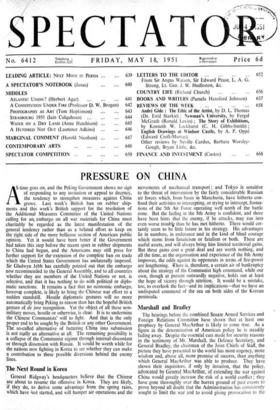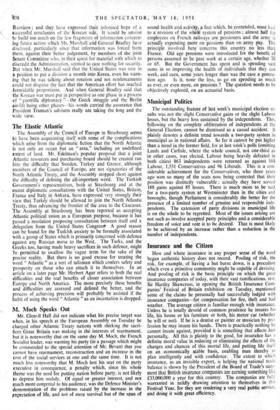Marshall and Bradley
The hearings before the combined Senate Armed Services and Foreign Relations Committee have shown that at least one prophecy by General MacArthur is likely to come true. As a figure in the determination of American policy he is steadily fading away. Despite the essential cuts made for security reasons in the testimony of Mr. Marshall, the Defence Secretary, and General Bradley, the chairman of the Joint Chiefs of Staff, the picture they have presented to the world has more cogency, more wisdom and, above all, more promise of success, than anything which General MacArthur was able to produce. They have shown their inquisitors, if only by iteration, that the policy, advocated by General MacArthur, of extending the war against China would greatly increase the risk of a world conflict ; they have gone thoroughly over the barren ground of past events to prove beyond all doubt that the Administration has consistently sought to limit the war and to avoid giving provocation to the Russians ; and they have expressed their informed hope of a successful conclusion of the Korean wk. It would be unwise to build too much on the few fragments of information concern- ing future action which Mr. Marshall and General Bradley have disclosed, particularly since that information was forced from them, against their better judgement, by members of the joint Senate Committee who, in their quest for material with which to discredit the Administration, seemed to care nothing for security. But when Mr. Marshall said that the United States was now in a position to put a division a month into Korea, even his warn- ing that he was talking about rotation and not reinforcements could not disguise the fact that the American effort has reached formidable proportions. And when General Bradley said that the Korean war must put in perspective as one phase in a process of " guerrilla diplomacy "—the Greek struggle and the Berlin air-lift being other phases—his words carried the assurance that President Truman's advisers really are taking the long and the wide view.







































